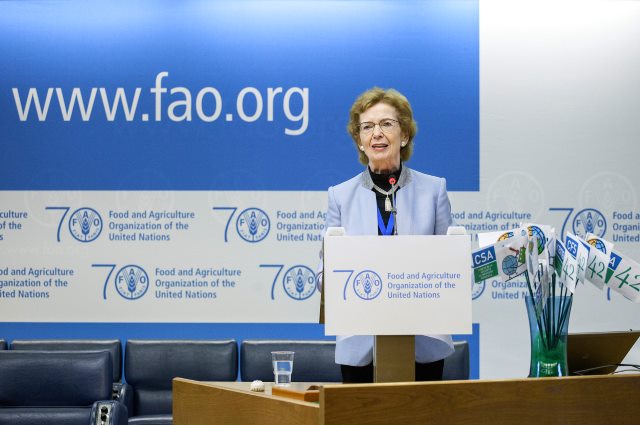Mary Robinson addressed the linkages between gender equality, climate change and food security during a keynote address at the 42nd session of the Committee on World Food Security in Rome.
“If we are to achieve SDG 2 and end hunger, achieve food security and improved nutrition and promote sustainable agriculture we have to empower women and girls”, Mary Robinson, President, Mary Robinson Foundation – Climate Justice, told the 800 assembled delegates for the 42nd session of the Committee on World Food Security (CFS), taking place in Rome this 12-14 October.
The CFS gathering, which focused on food security and nutrition in the Post-2015 Development Agenda, is the first major development conference since the adoption of the Post-2015 Development Agenda in New York last month. The conference brought together government representatives, private sector actors and members of civil society to examine local, regional and national approaches to improving food security and nutrition.
Commenting on efforts to date to integrate gender equality into food security and nutrition policies by organisations such as the Committee on World Food Security and Scaling Up Nutrition, Mary Robinson said “Cultural norms, competing policy priorities and capacity and resource constraints can impede progress. (…) Clearly there is a need to share examples, learn lessons, develop best practice as well as to identify the additional supports needed to achieve gender equality and ensure that all food and nutrition actions are gender responsive.“
In her address to the committee Mary Robinson reminded those gathered in Rome of the interlinkages between the 17 Sustainable Development Goals (SDGs).
“The experience of the MDGs has shown that addressing the goals in isolation, and addressing the environmental, social and economic aspects of development separately, limits success. This time round we need to be steadfast in our commitment to make equal progress on all of the goals, conscious of their interdependence and the co-benefits to be captured through coherent approaches. Because we know that if we make progress on food security and nutrition we will create co-benefits for SDG 3 on health and for SDG 4 on education”.
Equally, action on SDG 13 on climate change is critical to the delivery of the 17 Goals, as Mary Robinson said: “Action on climate change will have direct implications for the achievement of SDGs 1 and 2. Left unchecked, climate change has the potential to wipe out the development gains of recent decades. “
Efforts under the Millennium Development Goals fell just shy of their target to halve, between 1990 and 2015, the proportion of people who suffer from hunger. Today, 795 million people still go hungry, more than one in four children are affected by stunting, and nine percent of children are affected by wasting. The 2015 Global Hunger Index reveals that levels of hunger remain ‘serious’ or ‘alarming’ in 52 of the 117 countries with GHI scores.
Mary Robinson highlighted the link between the challenge of realising food security and nutrition in a climate impacted world referring to the Fifth Assessment Report of the Intergovernmental Panel on Climate Change (IPCC) which “tells us that climate related hazards will exacerbate the challenges faced by the poorest and most vulnerable people by negatively affecting their livelihoods. In the context of food security and the right to food, the Fifth Assessment Report finds that all aspects of food security will be threatened, including production, access and price stability.”
As countries develop climate policies in response to the new climate agreement, and as countries develop their plans to implement the SDGs, Mary Robinson noted that there will be opportunities to integrate food and nutrition into climate action and climate into policies on food and nutrition, health and agriculture. “In this way country plans for the SDGs have great potential to accelerate action on climate change so that emissions peak in 2020 and that resilience is built to cope with climate risk” she remarked.
The Committee on World Food Security (CFS) was established in 1974 as an intergovernmental body to serve as a forum in the United Nations System for review and follow-up of policies concerning world food security including production and physical and economic access to food.
Related Links
Dowload Mary Robinson’s Keynote Speech: Food Security and Nutrition in the Post 2015 Development Agenda – Goals, Action and Outcomes (448KB)
Hunger-Nutrition-Climate Justice – A New Dialogue: Putting People at the Heart of Global Development


